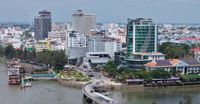The city of Can Tho is undergoing a significant administrative restructuring, with plans to merge with Hau Giang and Soc Trang provinces, creating a new Can Tho city by 2025. This merger will result in a streamlined governance model, reducing the number of administrative units while enhancing local governance effectiveness.
According to a report from the Ministry of Home Affairs, the new Can Tho city will operate with 32 administrative units at the commune level, a reduction of 48 communes and wards, achieving a 60% decrease. Hau Giang province will see a similar reduction, with 28 administrative units remaining after a decrease of 47, representing a 62.66% reduction. Soc Trang province will also trim down to 43 administrative units, down from 65, which is a 62.50% decrease.
After the merger, the new Can Tho city is projected to encompass 103 administrative units, including 31 wards and 72 communes, marking a total reduction of 160 units compared to the previous structure, equating to a 62.74% decrease. Notably, eight administrative units will remain unchanged, including six communes: Thanh Phu, Thoi Hung (from Co Do district), Truong Long (from Phong Dien district), as well as My Phuoc (from My Tu district), Vinh Hai, and Lai Hoa (from Vinh Chau town). These units were preserved due to their compliance with both area and population standards.
In addition, the Tan Loc ward (from Thot Not district) and Phong Nam commune (from Ke Sach district) are proposed to remain unchanged due to special circumstances that warrant their preservation.
This restructuring aligns with the resolution from the Central Executive Committee of the Party, which advocates for the unification of Can Tho city with Hau Giang and Soc Trang provinces. The political and administrative center will be established in the current Can Tho city, which will cover an area of 6,400.83 square kilometers and serve a population of over 4 million people.
Alongside this significant shift, Ho Chi Minh City has also set forth specific standards for leadership and management positions at the commune level following the administrative arrangement. These standards apply to various roles within the local governance framework, including members of the Party Executive Committee and leaders of specialized agencies.
The standards dictate that individuals in leadership roles must possess appropriate professional qualifications, leadership skills, and a proactive approach to problem-solving. For key positions such as Party Committee Secretary and Chairman of the People's Council at the commune level, candidates are required to have a university degree and advanced political theory qualifications. Additionally, local regulations stipulate that these leaders should not be from the locality they govern.
In cases where the commune is complex in terms of construction order and land management, the city prioritizes candidates with relevant experience and qualifications. The arrangement of positions will follow a clear hierarchy, with district-level secretaries being favored for key roles in economically and socially significant areas.
As part of the restructuring, the city has also emphasized the importance of streamlining staff and enhancing the quality of local governance. This includes a commitment to complete the arrangement and reduction of personnel within five years, ensuring that staffing aligns with the evolving needs of local administration.
Moreover, the Ministry of Home Affairs, led by Minister Pham Thi Thanh Tra, has highlighted the pressing need for reform in local governance structures. The proposed amendments to the Law on Organization of Local Government aim to establish a two-level local government model, replacing the current three-level system. This shift will involve transferring approximately 90 tasks from the district level to the commune level, thereby enhancing local governance capabilities.
When the National Assembly approves the amended law, the government will issue 25 decrees to clarify the decentralization and delegation of powers. The report on the implementation of these tasks is due to the Politburo by May 9, 2025.
In terms of classification, the new administrative units will be categorized into three levels, corresponding to their development and management conditions. The number of deputies in provincial People's Councils will also be adjusted based on the natural area and population of each locality, ensuring a minimum of 55 deputies and a maximum of 90.
Furthermore, the Minister of Home Affairs has emphasized that the authority of the Provincial People's Committee will remain intact. If the Chairman is absent, the People's Council is responsible for submitting a request to the Prime Minister for decision-making. This measure is intended to ensure effective governance and management across all administrative levels.
The ongoing administrative reforms in Can Tho and Ho Chi Minh City reflect a broader commitment to improving local governance, enhancing efficiency, and ensuring that the administrative structure meets the needs of the population it serves. As these changes unfold, the focus remains on creating a more streamlined and effective local government that can respond to the demands of modern governance.





